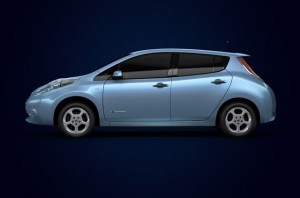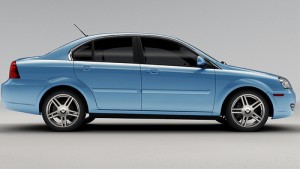 Up against fickle consumers, an uncertain regulatory environment and marketplace, and industry giants, electric-car startups need every break they can get. So when yesterday VentureBeat learned that Japanese automaker Nissan will only release five of the much-anticipated all-electric Leaf this year (pictured, right) in the U.S., we immediately wondered: Could this be good news for Coda?
Up against fickle consumers, an uncertain regulatory environment and marketplace, and industry giants, electric-car startups need every break they can get. So when yesterday VentureBeat learned that Japanese automaker Nissan will only release five of the much-anticipated all-electric Leaf this year (pictured, right) in the U.S., we immediately wondered: Could this be good news for Coda?
It appears that supply will continue to be limited well into early 2011 — to the extent that Nissan has advised dealers to steer Leaf buyers away from the color silver, which has been ordered in overabundance. With 20,000 reservations and a community of eager would-be owners, will buyers be willing to wait for the Leaf?
 If they’re not, that could be an advantage for electric car startup Coda, which could scoop up the much-needed sales. The company has set an aggressive goal of 14,000 cars sold by the end of 2011 (Update: looks like that target has been modified to “first year on sale”), and wants to raise another $125 million pre-IPO, but recently lost its CEO.
If they’re not, that could be an advantage for electric car startup Coda, which could scoop up the much-needed sales. The company has set an aggressive goal of 14,000 cars sold by the end of 2011 (Update: looks like that target has been modified to “first year on sale”), and wants to raise another $125 million pre-IPO, but recently lost its CEO.
As the new kid on the block, Coda has probably come the closest — behind Tesla — to creating a noteworthy electric car that goes to mass market, with an electric sedan it’s preparing to sell next year (pictured, left). But it also faces a slew of challenges and recently pushed back the car’s launch date from this December to the third quarter of 2011.
Coda is competing head-to-head with the Leaf, which is $12,000 cheaper and comes from a name brand. At $45,000 before state and federal tax incentives, it’s also more expensive than the electric hybrid Chevy Volt, which retails for $41,000 before tax credits and is hitting dealerships in December.
“It’s not coming from a name brand. It’s really hard to see how this is going to be successful,” said Jacob Grose, Lux Research analyst. “I don’t see why people would choose the Coda over the Chevy Volt or Nissan Leaf.”
The Coda sedan does boast some small advantages — it can charge faster, and claims to have a longer range of 120 miles, compared to the Leaf’s 100 miles. The Coda sedan also claims to have a better thermal battery management system than the Leaf, which could mean better consistency in range. But none of those things necessarily have a wow factor that justifies the $12,000 price difference over the Leaf.
“Coda’s advantage at this point is that it’s probably a supply constrained market,” says John Gartner, Pike Research analyst. “There’s a lot of interest in electric vehicles that outstrip the available supply for the next 18 to 24 months.”
Coda also plans to launch first in the California market, with a sales strategy that mirrors Apple’s and is similar to Tesla’s. It will open about 17 storefronts in high-traffic malls over the next year, according to spokesman Matt Sloustcher, giving visitors a chance to check out the car and learn about electric cars in a no-pressure sales environment. California is a first-launch state for most electric cars given high gas prices and a progressive stance on cleantech. And it offers a $5,000 tax credit for electric car buyers — combined with the $7,500 federal credit, that knocks $12,500 off the price tag.
The sales strategy doesn’t impress analyst Grose, who says that cars a much tougher sell than iPods. But the key to Coda’s future may well be in fleet sales. The company is targeting 40 to 50 percent of its planned 14,000 sales in the next year to go to fleets.GM does big business in fleet sales (think police cars and rental services), and recently landed a deal with GE to supply the company with 12,000 electric cars by 2015, underscoring the importance of fleets sales in electric car adoption. Coda recently announced a deal for 100 of its sedans with Enterprise Rent-A-Car, and hired new fleet sales executives with backgrounds in GE, Mercedes-Benz and Chrysler.
“Tesla was the first mover so they don’t have the first-mover advantages. The really successful small guys are going to be the ones who target fleets, not the ones tring to go head-to-head in the consumer vehicle markets,” Grose said. “It’s hard enough for Nissan and Tesla; it’s going to be pretty much impossible for Coda and (hybrid sports car startup)Fisker.”
VentureBeat's mission is to be a digital town square for technical decision-makers to gain knowledge about transformative enterprise technology and transact. Learn More
